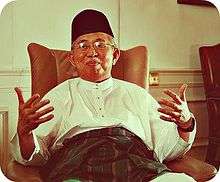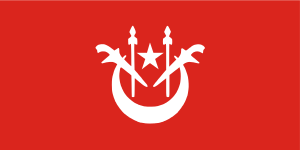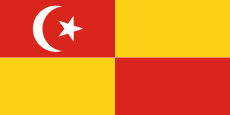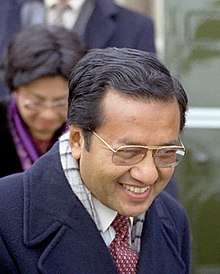Tengku Razaleigh Hamzah
Tengku Razaleigh bin Tengku Mohd Hamzah (Jawi: تڠکو غزالي بن تڠکو محمد حمزه; born 13 April 1937) is a Malaysian politician and Member of Parliament (MP) for Gua Musang from the state of Kelantan. He is dubbed the Father of Malaysia's Economy for playing a pivotal role in establishing and implementing key foundations and policies in Malaysia's economy.[1][2][3][4][5][6][7] A descendant of Malay royalty, he is a great-uncle of the current Sultan of Kelantan. "Tengku" is a hereditary royal Malay title, equivalent to "Prince/ss."
Tengku Razaleigh Hamzah DK (Kelantan) PSM SSAP SPMS MP | |
|---|---|
تڠکو غزالي بن تڠکو محمد حمزه | |
.jpg) | |
| Minister of Trade and Industry | |
| In office 14 July 1984 – 20 May 1987 | |
| Monarch | Ahmad Shah Iskandar |
| Prime Minister | Mahathir Mohamad |
| Deputy | Muhyiddin Yassin (1984–1986) Oo Gin Sun (1984–1986) Kee Yong Wee (1986) Kok Wee Kiat (1986–1987) |
| Preceded by | Tengku Ahmad Rithauddeen Tengku Ismail |
| Succeeded by | Rafidah Aziz |
| Constituency | Ulu Kelantan Gua Musang |
| Minister of Finance | |
| In office 15 January 1976 – 14 July 1984 | |
| Monarch | Yahya Petra Ahmad Shah |
| Prime Minister | Hussein Onn Mahathir Mohamad |
| Deputy | Richard Ho Ung Hun (1976–1977) Rafidah Aziz (1977–1980) Neo Yee Pan (1977–1979) Mak Hon Kam (1979–1982) Shahrir Abdul Samad (1980–1981) Najib Razak (1981–1982) Sabbaruddin Chik (1982–1984) Ling Liong Sik (1982–1984) |
| Preceded by | Hussein Onn |
| Succeeded by | Daim Zainuddin |
| Constituency | Ulu Kelantan |
| Founding Chairman & Chief Executive PETRONAS | |
| In office 1972–1974 | |
| Member of the Dewan Rakyat for Gua Musang (previously Ulu Kelantan) | |
| Assumed office 24 August 1974 | |
| Preceded by | Nik Ahmad Kamil Nik Mahmud (UMNO–Alliance) |
| Majority | Unopposed (1974) 4,562 (1978) 5,763 (1982) 7,319 (1986) 13,249 (1990) 8,980 (1995) 4,746 (1995) 2,925 (1999) 6,598 (2004) 4,394 (2008) 8,413 (2013) 3,913 (2018) |
| Personal details | |
| Born | Tengku Razaleigh bin Tengku Mohd Hamzah 13 April 1937 Kota Bharu, Kelantan, British Malaya (now Malaysia) |
| Citizenship | Malaysian |
| Political party | United Malays National Organisation (UMNO) (1962–1988; 1996–present) Parti Melayu Semangat 46 (S46) (1989–1996) |
| Other political affiliations | Barisan Nasional (BN) (1962–1988; 1996–present) Perikatan Nasional (PN) (2020-present) Muafakat Nasional (MN) (2019-present) Gagasan Rakyat (GR) (1990-1996) Angkatan Perpaduan Ummah (APU) (1990-1996) |
| Spouse(s) | Nur Yvonne Abdullah (1996-2015) |
| Residence | Kuala Lumpur |
| Alma mater | Queen's University Belfast |
| Occupation | Politician |
| Tengku Razaleigh Hamzah on Parliament of Malaysia | |
He was the Minister of Finance (1976–1984), Minister of International Trade and Industry (1984–1987), former chairman of Asian Development Bank, former chairman of Islamic Development Bank, founding Chairman and Chief Executive of Malaysian oil company, PETRONAS, and chairman of the 33rd Board of Governors of the World Bank and IMF.[8] He is now the longest serving member of parliament in Malaysia.[9] His popularity has earned him nicknames such as "The People's Prince" and "Ku Kita" (Our Tengku). He is affectionately known as Ku Li, derived from the last syllables of Tengku Razaleigh; a common custom in the Kelantan dialect.[10]
Early life and education

Razaleigh was born in Kota Bharu to Tengku Seri Maharaja, Tengku Muhammad Hamzah Ibni Almarhum Raja Dewa Tengku Zainal Abidin, who was the Menteri Besar of Kelantan. Razaleigh was educated at English-medium schools and attended Sultan Ismail College before moving on to the Malay College Kuala Kangsar (MCKK). He left MCKK disliking the boarding school environment there, and transferred to Anderson School in Ipoh, Perak. He received a Bachelor of Science in Economics from the Queen's University of Belfast in 1959 and later continued his studies at Lincoln's Inn. However, upon his father's death, he was forced to return and never continued his studies.[11][12]
Razaleigh took over the family business, and then joined the United Malays National Organisation (UMNO), a major Malay political party.[11]
Involvement in Malaysia's economic development
Starting from the mid-1960s, with the support of the then Prime Ministers Tunku Abdul Rahman and Tun Abdul Razak, several initiatives launched to increase and expand Malaysia's economic growth. Several of these initiatives were led by Razaleigh. These initiatives were major corporate takeovers of foreign conglomerates and major industries which was previously owned by foreign shareholders respectively.
Due to his excellent drive and contribution to the country's economy, and his strong economics and finance background, he was entrusted to manage the country's finance and was made the Finance Minister in 1976, Chairman of Asian Development Bank in 1976, IBRD (World Bank) and IMF in 1977, and Islamic Development Bank in 1978.
New Straits Times Press
The New Straits Times Press (initially News Straits Times Press Sdn Bhd) was formed by the Directors of the Straits Times Press (Malaysia) Berhad, to acquire a majority shareholding in the company which was the largest mass-circulation news organ in the territories of East and West Malaysia.
The Malaysia operations of the Straits Times, the Sunday Times, the Malay Mail, the Sunday Mail, Berita Harian and Berita Minggu were transferred to this new company. An agreement was reached in 1972 between the directors of the Straits Times group and Tengku Razaleigh Hamzah for the disposal of 80 per cent of the stock of the News Straits Times Press (Malaysia) Sdn. Bhd. for the Malaysian interest.[13]
Bank Bumiputra Malaysia Berhad
On 4 June 1965, "Kongres Ekonomi Bumiputra" (Bumiputra Economic Congress), sponsored by the Ministry of National and Rural Development, were held in Kuala Lumpur for 3 days to generate an interest among Malays and other local indigenous groups to participate in commerce and industry. Seven working committees were formed to achieve these objectives.[14]
Tun Abdul Razak, the then Deputy Prime Minister of Malaysia announced that the Government had agreed to form a local Bank ("Bank Bumiputra") as recommended by the Economic Congress based on a majority of the 69 resolutions passed in the meeting.[15] The Bank, with its initial capital to be provided by the Malaysian Government, would be established. The Bank's ownership would ultimately be sold to the public through shares. On 15 July 1965, Tun Abdul Razak announced the Government agreed to provide RM5 million as the initial capital for Bank Bumiputra.[16] In an event presenting certificate to 80 students at "Taman Latehan Wanita", Lornie Road, Tun Abdul Razak reiterated that the main aim of the bank was to assist rural businessmen in the form of loans irrespective of religion.[17]
Bank Bumiputra Malaysia Berhad was formally launched by Tun Abdul Razak on 1 October 1965 with authorised capital of RM25 million, instead of RM5 million announced earlier.[18] The senior management was headed by Mohd Raslan bin Dato' Abdullah (managing director), former Accountant General of Government and Tengku Razaleigh (Executive Director). The other board members are S.O.K. Ubaidulla (President of United Chamber of Commerce), L.E Osman (a lawyer), K. Mushir Ariff (an incorporated valuer), Wan Yahya bin Haji Mohamad (a businessman from Terengganu), K.D. Eu (a company director, and Kuok Hock Nien (a company director). The general manager of the Bank was Wong Aun Pui, a prominent local banker with 20 years of experience and director of many rubber and palm oil companies.[19]
Perbadanan Nasional Berhad (PERNAS)
PERNAS (Perbadanan Nasional Berhad or National Corporation) was set up in November 1969 as a wholly owned government company to carry out the resolutions at the Second Bumiputera Economic Congress. Among the major shareholders included were Malaysia's Ministry of Finance, Bank Negara Malaysia (The Central Bank of Malaysia) and Bank Bumiputera Malaysia Berhad. Pernas was put under a solid footing under the chairmanship of Razaleigh (1970–1974) who had been the Minister of Finance from 1976 to 1984.[20]
With the background of poor and very low participation of Bumiputeras in the private sector and industries at that time, PERNAS' principle were to:
- enter undertakings which would bring high economic returns,
- when enter into joint ventures, PERNAS was to be the majority stockholder with controlling interest over operations,
- Bumiputeras were to be employed at all levels of operations and undertakings.[21]
8 subsidiaries were set up under PERNAS to achieve its objective. Malaysia National Insurance Berhad (MNI) was established in April 1970. There followed during 1971 Pernas Construction Sdn. Bhd., Pernas Engineering Sdn. Bhd., and Pernas Securities Sdn. Bhd. Then came Pernas Mining Sdn. Bhd (1973) and Pernas Edar Sdn Bhd (1974).
Razaleigh was in the thick of what became known as the Haw Par imbroglio of the mid-1970s, working with the Singapore-based Haw Par Brothers International Ltd, then an offshoot of the empire of British wheeler-dealer Jim Slater, to acquire control of London Tin Company, the British-controlled tin conglomerate, and the Sime Darby plantations conglomerate.[22] This was to be achieved through a complex series of transactions by which PERNAS would end up as the largest shareholder of both. It failed when Singapore accused Haw Par of financial irregularities and later jailed a senior executive and the head, Donald Watson, fled to Ireland.
But it proved a short-lived setback for Razaleigh. Within two years, a share and proxy battle orchestrated by merchant bank Rothschild – which was also a part owner of Bumiputera Merchant Bankers – brought Sime Darby under Malaysian control and its headquarters shifted to Kuala Lumpur. Control of London Tin Company was acquired the same year. In another coup in 1979, Malaysian money made a "dawn raid" on British plantation giant, Kumpulan Guthrie Bhd, which wrenched the company from British control; most of the other British owned plantations soon followed.[23]
Among the major corporate takeover exercise and formation of new businesses during Razaleigh's stewardship as Pernas chairman were
- Insurance – Malaysia National Insurance Bhd,
- Banking – Maybank Bhd,
- Mining – the then-largest tin mining company in the world, London Tin Company, which was later renamed MMC Corporation Berhad.
- Palm Oil and Rubber Producer – Sime Darby, Guthrie Berhad, Highlands & Lowlands Berhad.
Malaysia's first trade delegation to China

In 1971, Razaleigh's led trade delegation went to China to initiate a prospect of initiating a business relationship.[24] During the visit to China, Razaleigh managed to meet the then China's Premier Zhou En Lai. Total trade with China stood at a mere RM105.6 million in 1971, but ballooned to RM1.6 billion in 1980. Since then the contact between the two countries has been on the increase as evidenced by the number of visits of trade, medical and sports delegations to China.
Petroliam Nasional Berhad (PETRONAS)
On 6 September 1974, Malaysia's then prime minister, Tun Abdul Razak, announced the appointment of Razaleigh as chairman and Chief Executive of PETRONAS (Petroliam Nasional Berhad). Tun Razak said: "From among the new blood, I intended to bring Tengku Razaleigh into the Cabinet. However, I have an important job for him, a job as important as that of a Cabinet Minister. I have decided to appoint him as chairman and Chief Executive of PETRONAS, which is equivalent to being a Cabinet Minister.".[25] Subsequently, Razaleigh had to relinquish his job as Chairman of PERNAS which he held from 1970, but retained the chairmanship of Bank Bumiputra.

Permodalan Nasional Berhad (PNB)
The company was founded on 17 March 1978 based on an idea from Tengku Razaleigh Hamzah, as an instrument of the Government's New Economic Policy to promote share ownership among the Bumiputera, and to develop opportunities for deserving Bumiputera professionals to participate in the creation and management of wealth.
Today, PNB is a major investor in Bursa Malaysia, investing nearly 10% of the market capitalisation of the bourse, across most major Malaysian corporations and also actively contributing towards the nation’s human capital development through scholarships and employment opportunities.
Setting up banking firms and other institutions
He also set up "Bank Pembangunan Malaysia" and founded and established both Bank Islam and Syarikat Takaful, an insurance company run in accordance with Syariah principles.
Institute of Marketing Malaysia (IMM) was founded by Razaleigh in 1977 and he became the Institute's first Patron.
Malaysian & Asean Chamber of Commerce
Razaleigh was President of Malay Chamber of Commerce and Industry, President of Malaysian Chamber of Commerce and Industry and consequently the President of ASEAN Chamber of Commerce and Industry. He played a major role in the strategic restructuring of the Malaysian economy. The Malaysian Chamber of Commerce acknowledged his expertise in the petroleum business and once called him the "Malaysian Oil Prince". In the 1975 Malaysian Chamber of Commerce resolution, Razaleigh was named "Father of Malaysian Economic Development".
1960s : The early years
As the former president of the Malayan Students Union in London and secretary of the Malay Society in Britain, Razaleigh has entered into politics on 23 April 1962. He was unanimously elected as chairman of the Ulu Kelantan Division of UMNO at its annual meeting. He had returned to Malaya earlier that year to attend the funeral of his father.[26][27]
Tengku Razaleigh was part of the Malaya's delegation to the United Nation for 17th Session of the U.N. General Assembly in 1962. The leader of the delegation was Dato' Dr. Ismail bin Dato' Abdul Rahman, the then-Minister of Internal Security.[28]
In the 1969 general election, Razaleigh won Kelantan State Legislative Assembly seat of Ulu Kelantan Barat. Him, being of royal blood has the right to use the combined title of 'Yang Berhormat' which is the equivalent to 'The Honourable' and 'Yang Mulia' which is equivalent to 'His Highness'. Hence, he has the combined title of Yang Berhormat Mulia. If translated to English, it would be His Highness, The Honourable Tan Sri Tengku.
1970s : The rise
In 1971, he was elected to the UMNO Supreme Council. Besides Musa Hitam and Prof. Abdul Jalil Hassan, he was among the new 7 faces in the Supreme Council.[29]
Later he was appointed as the Treasurer of UMNO by the then-President of UMNO Tun Abdul Razak in 1973.
In 1975, after securing the most votes for the Vice-President post in the party election, he continue to serve as one of the Vice-Presidents of UMNO.[30]
In the 1974 general election, Razaleigh won the Parliamentary seat of then-Ulu Kelantan (now known as, Gua Musang).
After Prime Minister Tun Abdul Razak's sudden death in 1976, he was appointed as Finance Minister by the new Prime Minister, Hussein Onn. Razaleigh's planning is reputed to have been the main reason the Barisan Nasional (BN) coalition, of which UMNO is a member, almost totally defeated the opposition Islamic party of PAS in the 1978 general election and the Kelantan state elections of the same year.[11]
1980s
When Mahathir bin Mohamad succeeded Hussein Onn as Prime Minister, he declared the election for the Deputy Presidency of UMNO – and thus by extension the Deputy Prime Ministership – was open; he would not support any candidate. Razaleigh joined the fray, and his main opposition was Musa Hitam.[31] Eventually, Musa won the election with 722 votes to Razaleigh's 517 votes, becoming the new Deputy President and Deputy Prime Minister.[32] Razaleigh blamed himself for taking "a rather passive stance" and not having a campaign strategy.[33]
Tengku Razaleigh challenged Dr. Mahathir in the 1987 UMNO leadership election, which Dr. Mahathir managed to retain his party president position. However, UMNO was split into two separate entities as Tengku Razaleigh was left unsatisfied with the result.
The split forced the Malaysian court to declare UMNO as illegal. Shortly after the court ruling, Dr. Mahathir reestablished UMNO as UMNO Baru (New UMNO), though the new UMNO was badly weakened. Tengku Razaleigh at the same time went on his own path and found a new political party called Parti Melayu Semangat 46 (S46) in 1989. The number 46 refers to the year UMNO was founded.
1990s
In the 1993 Malaysian constitutional crisis, Razaleigh strongly opposed the amendment for Rulers to be tried at court and their legal immunity be stripped. However, his efforts failed to bear fruit as it did not gain enough support. In 1996, Tengku Razaleigh disbanded Semangat 46 and rejoined UMNO.
2000s
In 2004, he announced his interest for the UMNO top post yet again but failed to garner enough nominations to contest the presidency.
2010s
On 22 July 2011, Angkatan Amanah Merdeka (Amanah), a Non-Government Organisation was launched by Razaleigh at Memorial Tunku Abdul Rahman to revive and restore the spirit of Merdeka among Malaysians.[34] The organisation is led by Razaleigh himself as the President, along with several other public figures and prominent activists.
He lost his wife, Nur Yvonne Abdullah, who died on June 5, 2015 due to multiple myeloma, a disease she had been suffering from for the previous year. While being out of the limelight and shying away from the public, she was married to him since 1995.[35][36]
In the 2018 UMNO leadership election after the 14th general election which see the downfall of BN federal government and Najib Razak resignation as President of UMNO, Tengku Razaleigh contested the post of party president but lost to former Deputy Prime Minister Ahmad Zahid Hamidi in a three-corner fight with former Youth chief Khairy Jamaluddin.[37]
Media and public appearances
Tengku Razaleigh is one of many Malaysian politicians, celebrities, and other well-known personalities who appear in Pete Teo and Namewee's public service announcement voter education video "Undilah" on YouTube, released in 2011. Razaleigh provides a spoken word introduction to the rap song.
In conjunction with the 50th anniversary of the formation of Malaysia, Pete Teo released the video "Hari Malaysia", featuring many public figures and well-known personalities. Tengku Razaleigh was seen sitting next to Lim Kit Siang, another Malaysian prominent political figure, in Merdeka Stadium.
Election results
| Year | Constituency | Government | Votes | Pct | Opposition(s) | Votes | Pct | Ballots cast | Majority | Turnout | ||
|---|---|---|---|---|---|---|---|---|---|---|---|---|
| 1969 | S30 Ulu Kelantan Barat | Tengku Razaleigh (UMNO) | 4,061 | 63.57% | Hussin Abdullah (PAS) | 2,327 | 36.43% | N/A | 1,734 | N/A | ||
| Year | Constituency | Votes | Pct | Opponent(s) | Votes | Pct | Ballots cast | Majority | Turnout | |||
|---|---|---|---|---|---|---|---|---|---|---|---|---|
| 1974 | P27 Ulu Kelantan, Kelantan | Tengku Razaleigh (UMNO) | None | None | ||||||||
| 1978 | Tengku Razaleigh (UMNO) | 10,267 | 64.28% | Khaidir Khatib (PAS) | 5,705 | 35.72% | N/A | 4,562 | N/A | |||
| 1982 | Tengku Razaleigh (UMNO) | 15,573 | 61.35% | Hassan Mat Saman (PAS) | 9,810 | 38.65% | 26,100 | 5,763 | 80.68% | |||
| 1986 | P29 Gua Musang, Kelantan | Tengku Razaleigh (UMNO) | 12,538 | 70.61% | Wan Abdul Rahim Wan Abdullah (PAS) | 5,219 | 29.39% | 18,250 | 7,319 | 76.11% | ||
| 1990 | Tengku Razaleigh (S46) | 18,973 | 76.82% | Wan Ismail Ibrahim (UMNO) | 5,724 | 23.18% | 25,172 | 13,249 | 81.03% | |||
| 1995 | Tengku Razaleigh (S46) | 13,716 | 74.33% | Nik Ismail Wan Idris (AKIM) | 4,736 | 25.67% | 21,671 | 28,104 | 77.11% | |||
| 19951 | Tengku Razaleigh (S46) | 13,144 | 61.02% | Hussein Ahmad (UMNO) | 8,398 | 38.98% | 21,765 | 4,746 | 77.72% | |||
| 1999 | Tengku Razaleigh (UMNO) | 12,825 | 56.44% | Razak Abas (PAS) | 9,900 | 43.56% | 23,176 | 2,925 | 77.54% | |||
| 2004 | P32 Gua Musang, Kelantan | Tengku Razaleigh (UMNO) | 13,570 | 66.06% | Zulkefli Mohamad (PAS) | 6,972 | 33.94% | 21,076 | 6,598 | 80.64% | ||
| 2008 | Tengku Razaleigh (UMNO) | 14,063 | 59.10% | Zulkefli Mohamad (PAS) | 9,669 | 40.64% | 24,283 | 4,394 | 83.77% | |||
| 2013 | Tengku Razaleigh (UMNO) | 21,367 | 62.14% | Wan Abdul Rahim Wan Abdullah (PAS) | 12,954 | 37.67% | 35,097 | 8,413 | 87.36% | |||
| 2018 | Tengku Razaleigh (UMNO) | 19,426 | 48.64% | Abdullah Hussein (PAS) | 15,513 | 38.84% | 41,206 | 3,913 | 78.45% | |||
| Mohd Nor Hussin (PPBM) | 4,997 | 12.51% | ||||||||||
Note: 1 On 1 August 1995, the Kota Bharu High Court ordered a fresh election for the Gua Musang Parliamentary Seat after declaring the contest in the 8th General Election held in April the same year earlier null and void. Tengku Razaleigh Hamzah was the incumbent MP.[48]
Honours
Honours of Malaysia





- Note: Both awards from Kelantan were rescinded on 2 December 2010. DK was reinstated some time in June 2018. Status of the SPMK award is unknown.[52]




See also
Notes and references
- British Business in Post-Colonial Malaysia, 1957-70 Neo-colonialism Or Disengagement?, Nicholas J. White, Page 78, Routledge
- Malaysiaís foreign policy the first fifty years Alignment neutralism Islamism 1957-70: Neo-colonialism Or Disengagement?, Johan Saravanamuttu, Page 141, Institute of Southeast Asian Studies
- The Straits Times, 7 July 1975, Page 10, National Library, Singapore
- Tengku Razaleigh, Rintangan Dan Cabaran, Alias Muhammad, Page 42, Gateway Publishing House
- Ageing Ku Li gives up on Umno top post The Star
- Tengku Razaleigh: A De Gaulle or Rab Butler of Malaysian Politics Din Merican
- "The Umno, PKR and PAS internal strife (part 7)". Malaysia Today.
- "President Carter's speech at the 33rd Annual Meetings of IBRD and IMF Board of Governors".
- Ku Li now longest-serving MP The Star
- "ASIANOW - Asiaweek | Malaysia: The Leader in Waiting | 11/12/99". edition.cnn.com. Retrieved 18 October 2015.
- Tan, Chee Khoon & Vasil, Raj (ed., 1984). Without Fear or Favour, p. 45. Eastern Universities Press. ISBN 967-908-051-X.
- "Pulang Dari England Kerana Ayah Sakit". Berita Harian (in Malay). Singapore: Straits Times Singapore. 22 February 1962. p. 5.
- The Straits Times 17 September 1972 page 1, National Library, Singapore
- The Straits Times 5 May 1965 page 18, National Library, Singapore
- The Straits Times 8 May 1965 page 1, National Library, Singapore
- The Straits Times 15 July 1965 page 11, National Library, Singapore
- The Straits Times 4 September 1965 page 11, National Library, Singapore
- The Straits Times 1 October 1965 page 1, National Library, Singapore
- The Straits Times 10 March 1966 page 10, National Library, Singapore
- The Developing Economies, Malaysia's Localization Policy and its impact of British owned Enterprises, Page 372, Institute of Developing Economies, Japan
- The Developing Economies, Malaysia's Localization Policy and its impact of British owned Enterprises, Page 374, Institute of Developing Economies, Japan
- The Straits Times 2 January 1976 page 5, National Library, Singapore
- "A Onetime Political Star Returns to Malaysia's Stage". asiasentinel.com. 24 March 2008.
- The Political Economy of Malaysia's Trade Relation with China, John Wong, Page 9, Institute of Southeast Asian Studies
- The Straits Times 7 September 1974 page 8, National Library, Singapore
- The Straits Times 24 April 1962 page 11, National Library, Singapore
- Hashim, Zakaria (18 July 1962). "Perubahan besar dalam UMNO Kelantan". Berita Harian (in Malay). Singapore: Straits Times. p. Page 5.
- The Straits Times, 10 September 1962, Page 5, National Library, Singapore
- "7 muka baru terpileh jadi ahli Majlis Kerja UMNO". Berita Harian (in Malay). Singapore: Straits Times. 25 January 1971. p. 1.
- Leifer, Michael; Liow, Joseph (1995). Dictionary of the Modern Politics of Southeast Asia. New York: Routledge. p. 320. ISBN 978-0-415-62531-9.
- Tan & Vasil, p. 42.
- Tan & Vasil, p. 204.
- Tan & Vasil, p. 112.
- "Amanah diketuai Ku Li dilancar Jumaat, sandar amanat Tunku". The Malaysian Insider. 20 July 2011. Archived from the original on 26 December 2013.
- "Ku Li's wife passes away - The Rakyat Post". The Rakyat Post. Retrieved 18 October 2015.
- "Noor Yvonne, wife of Tengku Razaleigh, dies - The Malaysian Insider". www.themalaysianinsider.com. Archived from the original on 16 December 2015. Retrieved 18 October 2015.
- Hemananthani Sivanandam and Tarrence Tan (1 July 2018). "Zahid Hamidi officially wins Umno presidency". The Star Online. Retrieved 1 July 2018.
- "Kelantan Dalam Sejarah: Kerana Cina S'pura, Menteri Besar PAS Dan PM Bersumpah Di Masjid, Menjelang 13 Mei 1969". sokmo.net.
- "Berita Wilayah". bernama.com.
- "Pilihan Raya Umum Malaysia". pmo.gov.my. Archived from the original on 18 December 2014.
- "Keputusan Pilihan Raya Umum Parlimen/Dewan Undangan Negeri" (in Malay). Election Commission of Malaysia. Retrieved 4 February 2017. Percentage figures based on total turnout.
- "Malaysia General Election". undiinfo Malaysian Election Data. Malaysiakini. Retrieved 4 February 2017. Results only available from the 2004 election.
- "KEPUTUSAN PILIHAN RAYA UMUM 13". Sistem Pengurusan Maklumat Pilihan Raya Umum (in Malay). Election Commission of Malaysia. Retrieved 24 March 2017.
- "my undi : Kawasan & Calon-Calon PRU13 : Keputusan PRU13 (Archived copy)". www.myundi.com.my. Archived from the original on 31 March 2014. Retrieved 9 April 2014.
- "Keputusan Pilihan Raya Umum ke-13". Utusan Malaysia. Retrieved 26 October 2014.
- "SEMAKAN KEPUTUSAN PILIHAN RAYA UMUM KE - 14" (in Malay). Election Commission of Malaysia. Retrieved 17 May 2018. Percentage figures based on total turnout.
- "The Star Online GE14". The Star. Retrieved 24 May 2018. Percentage figures based on total turnout.
- New Straits Times May 8, 1997 Page 2
- "Senarai Penuh Penerima Darjah Kebesaran, Bintang dan Pingat Persekutuan Tahun 1973" (PDF).
- "Ku Li's titles revoked by Sultan of Kelantan". The Star. 5 December 2010. Retrieved 12 November 2019.
- "Ku Li has been stripped of two Kelantan state awards". The Star. 5 December 2010. Retrieved 12 November 2019.
- "Ku Li wore DK sash at the Installation 16th Yang di-Pertuan Agong of Malaysia on 30 July 2019". Instagram. Retrieved 20 November 2019.
- "SPMS 1982". awards.selangor.gov.my. Retrieved 15 July 2020.
Other references
- Kamarudin, Raja Petra (9 November 2005). "The Anwar Factor". Malaysia Today.
External links
- Tengku Razaleigh Hamzah's Official Site updated with speeches, news, press releases.
- Tengku Razaleigh Hamzah's Official Facebook Page updated with public addresses and events
- Tengku Razaleigh Hamzah's channel on YouTube video archives of speeches, dialogues, Q&A sessions. Also included videos of Malaysia's past prime ministers (Tunku Abdul Rahman and Tun Hussein Onn's interviews)
.jpg)
